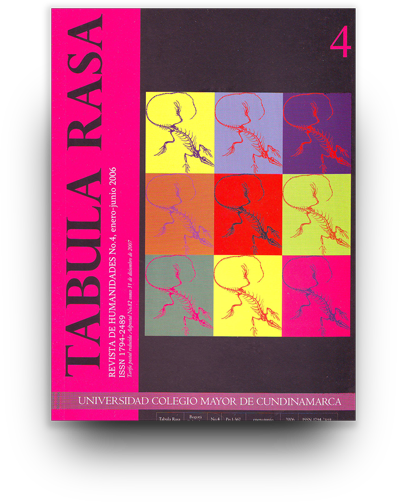Geographies of Knowledge in World Politics
Geografías del conocimiento en la política mundial
Show authors biography
The problem of «foundations» is a crucial one for any field, particularly perhaps one with as varied a possible repertoire of elementary sources as the study of world politics. In this paper, I want to draw attention to some different ways of thinking about how and where knowledge is produced; how knowledge circulates can be used to inform understanding about geographies of knowledge of world politics. Such geographies, however, are not ends in themselves. The point is to understand the ontological bases of knowing from perspectives that do not privilege a singular history of knowledge associated with a specific world region or of conceptions of knowledge that implicitly or explicitly presume their self-evident universality.
Article visits 72 | PDF visits 52
Downloads
Agnew, J. 2005. Hegemony: The New Shape of Global Power. Filadelfia: Temple University Press.
Asquith, P. 1996. «Japanese science and western hegemonies: primatology and the limits set to questions», en L. Nader (ed.) Naked Science: Anthropological Inquiry into Boundaries, Power, and Knowledge. Nueva York: Routledge.
Biersteker, T.J. 1995. «The “triumph” of liberal economic ideas in the developing world» en B. Stallings (ed.) Global Change. Regional Responses: The New International Context of Development. Cambridge: Cambridge University Press.
Brennan, T. 2006. Wars of Position: The Cultural Politics of Left and Right. Nueva York: Columbia University Press.
Casey, E. S. 1996. «How to get from space to place in a fairly short stretch of time» en S. Feld y K.H. Basso (eds.) Senses of Place. Santa Fe NM: School of American Research Press.
Haraway, D. 1989. Primate Visions: Gender, Race and Nature in the World of Modern Science.
Nueva York: Routledge.
Heidegger, M. 1987. Introduction to Metaphysics. New Haven: Yale University Press.
Hönnighausen, L. 2005. «Where we are? Some methodological reflections on space, place, and postmodern reality» en K. Benesch y K. Schmidt (eds.) Space in America: Theory/History/ Culture. Amsterdam: Rodopi Press.
Lauer, D. 2005. «”America and Russia are the same:” geopolitics in Heidegger’s» Seinsfrage. Telos, 132:132-50.
Livingstone, D.N. 2005. «Science, text and space: thoughts on the geography of reading» Transactions of the Institute of British Geographers, NS 30:391-401.
Lowenthal, D. 1961. «Geography, experience, imagination: towards a geographical epistemology» Annals of the Association of American Geographers, 51:241-60.
Massey, D. 2005. For Space. Londres: Sage.
Mignolo, W.D. 2000. Local Histories/Global Designs: Coloniality, Subaltern Knowledges, and Border Thinking. Princeton: Princeton University Press.
Pombeni, P. 2005. «Political models and political transfer in the shaping of Europe» European Review of History, 12:223-38.
Said, E.W. 1978. Orientalism. Nueva York: Harper.
Said, E.W. 1991. «Traveling theory» en The World, The Text and the Critic. Londres: Vintage.
Wright, J.K. 1947. «Terrae Incognitae: the place of the imagination in geography» Annals of the Association of American Geographers, 37:1-15.




